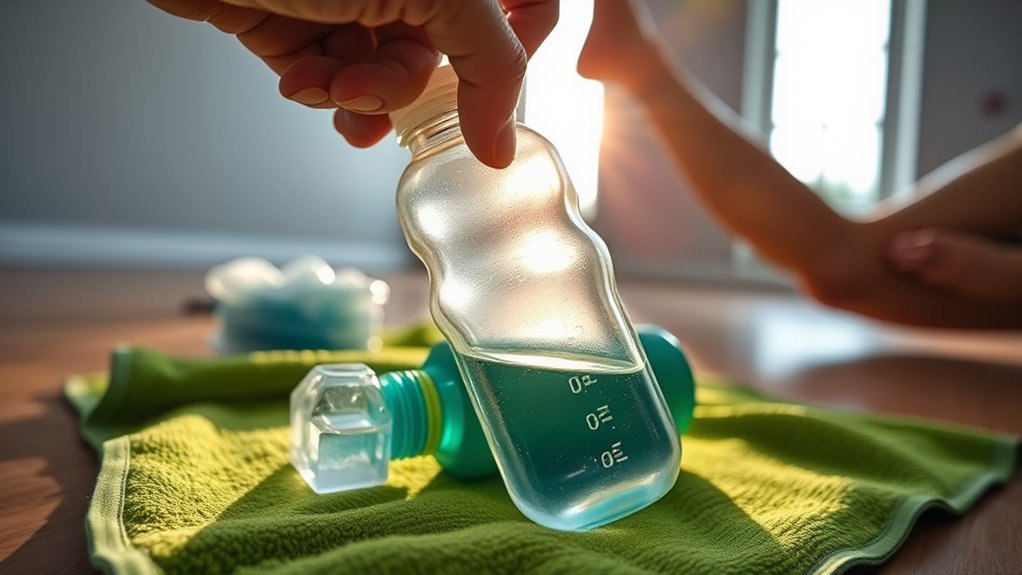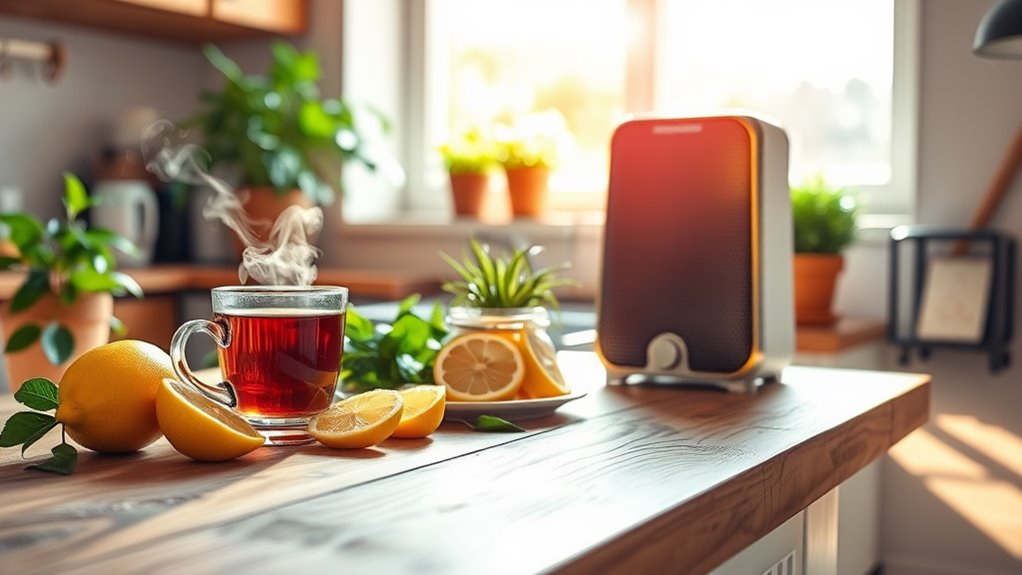To stop muscle cramps fast, focus on hydration and electrolyte balance. Drink plenty of water before, during, and after activity to prevent dehydration. Include foods rich in electrolytes, like bananas and spinach, to support muscle function. Stretching can also help alleviate cramps; make sure to stretch affected muscles gently and hold for 15-30 seconds. Regular stretching enhances flexibility and reduces the chances of cramps occurring. Finally, pay attention to your diet, as nutrient-rich meals play a crucial role in prevention. Stick around to discover more effective strategies for keeping those pesky cramps at bay!
Understanding Muscle Cramps
Muscle cramps can feel like an unwelcome jolt, disrupting your activities and causing discomfort. These involuntary contractions often strike suddenly, leaving you puzzled about their cause. They can occur during exercise or even while you're resting.
Factors like overexertion, strain, or muscle fatigue contribute to their onset, and you might notice them more during hot weather or intense physical activity. You could also be at a higher risk if you're not stretching properly or if your muscles are dehydrated.
Understanding the triggers behind your cramps is crucial in preventing them. By recognizing these patterns, you can take steps to minimize your risk, making your workouts and daily activities much more enjoyable and cramp-free.
Hydration and Its Importance
When you're active, staying hydrated is essential, as it plays a key role in preventing muscle cramps. Your muscles need water to function optimally, and dehydration can lead to tightness and cramping.
When you sweat, you lose fluids, and if you don't replenish them, your body becomes stressed, increasing the risk of cramps.
To keep your muscles happy, drink water before, during, and after your activity. Listen to your body—if you're feeling thirsty, take a sip.
Monitor the color of your urine; a lighter shade indicates proper hydration. Remember, even mild dehydration can affect your performance and lead to discomfort.
Electrolyte Balance Explained
Understanding electrolyte balance is crucial for preventing muscle cramps during physical activity. Your body relies on electrolytes like sodium, potassium, calcium, and magnesium to maintain proper muscle function. When you sweat, you lose these vital minerals, which can lead to cramps and fatigue.
| Electrolyte | Importance |
|---|---|
| Sodium | Regulates fluid balance |
| Potassium | Supports muscle contractions |
| Calcium | Aids in muscle movement |
| Magnesium | Prevents cramping |
To keep your muscles functioning optimally, replenish these electrolytes through balanced meals and hydration. Incorporating foods rich in these minerals can make a significant difference. Remember, proper electrolyte balance is key to enjoying your workouts without the hindrance of muscle cramps.
Effective Stretching Techniques
Stretching plays a vital role in preventing muscle cramps and enhancing overall flexibility. When you feel a cramp coming on, try to gently stretch the affected muscle.
For calf cramps, stand and place your weight on the affected leg while keeping the knee straight. Lean forward to stretch the muscle.
If it's a hamstring cramp, sit on the floor, extend your leg, and lean forward gently. Hold each stretch for at least 15-30 seconds, breathing deeply to relax your muscles.
Incorporating regular stretching into your routine can improve your flexibility and reduce the likelihood of cramps.
Remember to warm up before intense activities and cool down afterward to maintain your muscle health. Stay consistent, and your body will thank you!
Dietary Modifications for Relief
To effectively combat muscle cramps, it's essential to pay attention to your diet. What you eat directly affects your muscle function and hydration levels. Incorporating the right nutrients can help prevent cramps from occurring.
Consider adding these dietary modifications for relief:
- Electrolyte-rich foods: Include bananas, avocados, and spinach to replenish potassium and magnesium.
- Hydrating fluids: Drink plenty of water and consider coconut water for natural electrolytes.
- Whole grains: Opt for brown rice or quinoa to provide sustained energy and support muscle recovery.
Frequently Asked Questions
Can Muscle Cramps Happen During Sleep?
Yes, muscle cramps can definitely happen during sleep. You might wake up suddenly feeling a tightness in your leg or foot. Staying hydrated and stretching before bedtime can help reduce the chances of this discomfort.
Are Certain Medications Linked to Increased Muscle Cramps?
Yes, certain medications, like diuretics and statins, can increase your risk of muscle cramps. If you're experiencing cramps frequently, it's worth discussing your medications with your doctor to see if adjustments are needed.
How Can I Prevent Muscle Cramps During Exercise?
To prevent muscle cramps during exercise, stay hydrated, stretch before and after workouts, maintain a balanced diet rich in electrolytes, and gradually increase your workout intensity. Listen to your body, and rest when needed.
Is There a Specific Age Group More Prone to Cramps?
Yes, younger athletes and older adults are often more prone to muscle cramps. As you age, your muscles might lose flexibility, while younger individuals may push themselves harder during physical activities, increasing cramping risk.
Can Stress Contribute to Muscle Cramps?
Yes, stress can definitely contribute to muscle cramps. When you're stressed, your muscles may tense up, leading to discomfort and spasms. Managing stress through relaxation techniques can help reduce the frequency of these cramps.


